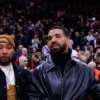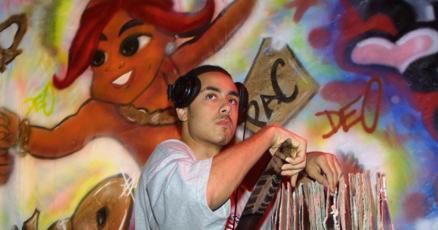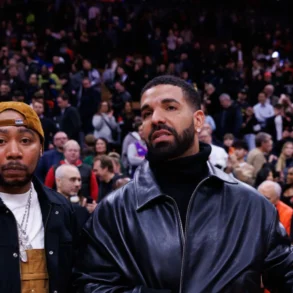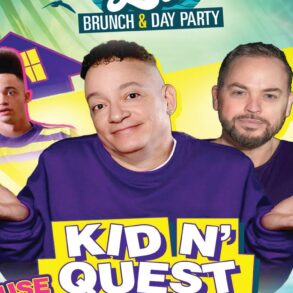Raj Smoove grew up surrounded by great New Orleans musicians. His father, Roger Dickerson Sr., is a Pulitzer Prize-nominated pianist and now retired educator who introduced his son to Allen and Reggie Toussaint. As a young teen, Raj Smoove became intrigued with DJs and hip-hop culture and worked his way to becoming a popular DJ during high school and at Dillard University.
In 2000, he became the DJ for Cash Money Records and Ruff Ryders Entertainment on their joint national tour and produced for Lil Wayne and Sqad Up in the years following. Lil Wayne once dubbed him “the greatest DJ in the world.”
Raj Smoove also runs The Gentilly Agency, which works with artists like Flagboy Giz, HaSizzle, DeeLow Diamond Man, Kr3wcial, 504IcyGrl and more.
This interview is part of an ongoing series of Q&As with New Orleans artists about the 50th anniversary of hip-hop.

Raj Smoove
Gambit: What was your introduction to hip hop?
Raj Smoove: The movie “Beat Street.” The whole story was about a DJ. The DJ was the hero of the movie, there were cool deserted buildings, parties, Doug E. Fresh and Grandmaster Flash and the Furious Five and Melle Mel were part of the final musical production. There was this whole cool scene where the dude is in his bedroom showing Rae Dawn Chong, the female lead, how to put the beat together with his cassette deck and turntable, and I was like, “Yo, that’s really cool — the DJ can get the girl!”
Gambit: Who was the first New Orleans hip-hop artist you admired?
Raj Smoove: Of course, the first big record was “Buck Jump Time” with Gregory D and Mannie Fresh. That was the first New Orleans hip-hop record I was made aware of.
But as far as the DJ side, I used to listen to [WYLD] FM 98.5 and DJ Rob Fresh would do live mixes from the radio station. They had a small club in the basement of the station and they would broadcast live from there. It was called “The Underground.” He used to DJ live on the air, and it was amazing for me to be able to hear somebody live, going back and forth on the turntables and doing mixes and scratches and everything.
That used to inspire me. I would go to the record store the following week and go buy some of the records that he used, to try to figure out how he did his mixes.
And then the first person that I actually saw live in person go back-to-back on turntables was DJ Money Fresh. That was at McDonogh 35 when I was a freshman [in 1991].
[embedded content]
Money Fresh, he and his group at the time called Suave Productions performed, and he went all around the turntables, back spinning. It was amazing for me. I’m 14 years old, and I’ve heard stuff on records, people scratching, but to actually see somebody do it. That was the first time I saw it in person.
It was kinda cool because it came full circle. Just this past October, at Gentilly Fest, I got to share the stage with Money Fresh. I’ve known him for years … here was one time, I was doing an event at UNO — I think I was still in high school — and Suave Productions was coming through to DJ and they were ribbing me about my record crates and my record sleeves. I wasn’t an actual DJ [then], I was just in my bedroom for the most part just doing it, so my record jackets were very, very clean.
They were making fun of me, “Ah, man, look at your record jackets. You don’t be DJ’ing nowhere.” But we’ve been cool for years, we crossed paths and did parties together. We’re cool. But when we did Gentilly Fest together, it was just kind of a moment for me, because the whole time we was up — there we was rockin’ in front of the audience — I was thinking back to that moment the first time I saw him in person. So to be there, some 30 years later, to be on a stage with the folks that I looked up to, and they view me a peer, it was a moment for me.
Gambit: What comes to mind for you when you think about the early 2000s in New Orleans hip-hop?
Raj Smoove: It was an amazing time. Cash Money was killing it. Like everything they put out was going platinum. No Limit was still on the scene doing their thing. It was music from the city that was relevant on a nationwide level.
So for me getting to go out and be on tour and being able to meet DMX, and all the Ruff Ryders, I met Aaliyah, and just being around the folks that I looked up to — I was a fan, but I’m actually out here doing this as part of my career path. That was an amazing time. My first time really going on tour and getting to see the country from that perspective. That was great.
And then the whole Young Money thing: I don’t think we really realized what it was we were doing at the time, and I wish there were some things that had been done to capitalize on it a little bit better, but that whole movement was extremely influential on the mixtape game at large.
What we were doing was before a lot of the mainstream mixtapes started popping off. It was cool to be ahead of the curve on that stuff. It was just a good time. It was like every day is a party, I wake up and got to do what I love. I still get to do that, so it’s been an amazing run.
That whole time period really helped springboard me and put me onto a track that I could have a successful career doing this full time.
Gambit: What has been New Orleans’ biggest contribution to hip-hop?
Raj Smoove: Bounce is probably the simplest answer. That might sound kinda generic, but bounce is definitely something that is completely ours. And you can see the influence 30 years later still through a lot of big records, a lot of big artists, producers. They’ve taken some of those bounce elements and incorporated that into their songs, into their hits.
That energy, that vibe — I think our genre has had an opportunity to saturate hip-hop as a whole.
[embedded content]
Gambit: Does New Orleans get the recognition it deserves for the contribution it makes to hip hop?
Raj Smoove: So New Orleans music has always had an issue of being a major musical influence but not really getting the credit and the monetary compensation for all those contributions.
If you think way back to like the early jazz and R&B sounds, and all of that, there are a lot of New Orleans musicians that were hired to play on nationally released records, but they didn’t necessarily get the proper compensation or attention for what it was they were doing.
A lot of early hip-hop, you know, people sampled The Meters. Whoever owns the publishing, I hope they got paid for it. But a lot of that classic hip-hop is coming from traditional New Orleans funk.
So, in a nutshell, I think from a general consumer standpoint: No, a lot of people are not aware of where things come from.
But if you talk to producers and you talk to folks that run labels and have been in the music business for a while, who have spent a lot of time in New Orleans, they’ll tell you where that flavor comes from. They will tell you about the influences and the things that they’ve incorporated, and how the music from here has influenced their style in their career.
If you’re just walking with Joe Schmo on the street, and ask them, they don’t know. But we’re working on it. We’re trying to get New Orleans people paid. Musicians that created, to be able to get correctly compensated and also get their homage and just due for what it was they’ve been doing and contributed to the music.
Gambit: This being the 50th anniversary, what has hip-hop come to mean to you today?
Raj Smoove: Hip-hop has been part of my life since I really got bitten by the bug, and I got interested in doing music. From trying to break dance on the cardboard U-Haul boxes, up to getting my first mixer and getting my first turntable, to the fact that creating hip-hop and DJing has taken me everywhere — it has provided for my family and my friends’ families and put food on the table. I am hip-hop. There’s not that much separation between what hip-hop is and who I am.
This post was originally published on this site be sure to check out more of their content.










